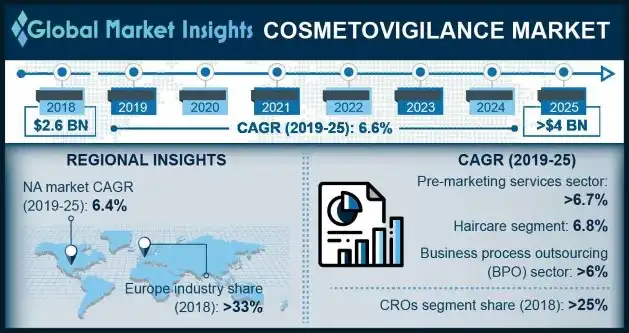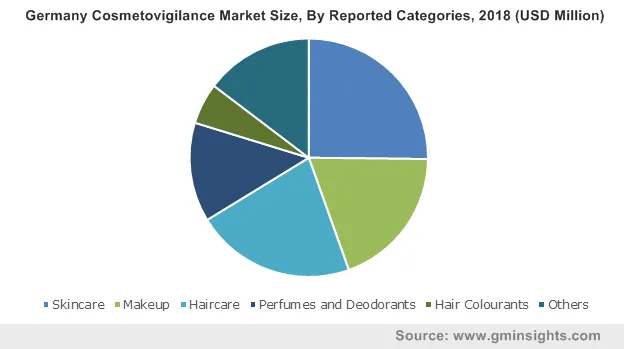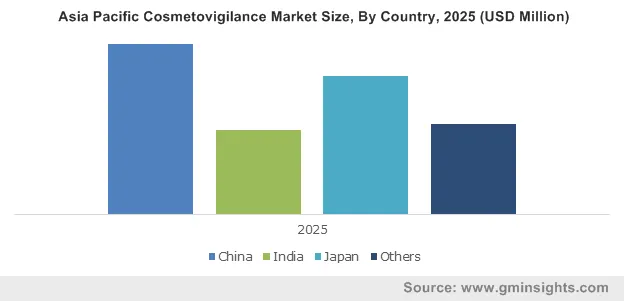Summary
Table of Content

Cosmetovigilance Market
Get a free sample of this report
Form submitted successfully!
Error submitting form. Please try again.
Thank you!
Your inquiry has been received. Our team will reach out to you with the required details via email. To ensure that you don't miss their response, kindly remember to check your spam folder as well!

Request Sectional Data
Thank you!
Your inquiry has been received. Our team will reach out to you with the required details via email. To ensure that you don't miss their response, kindly remember to check your spam folder as well!
Form submitted successfully!
Error submitting form. Please try again.
Cosmetovigilance Market Size
Cosmetovigilance Market size was valued at USD 2.6 billion in 2018 and is expected to witness 6.6% CAGR from 2019 to 2025.

To get key market trends
Growing adoption of cosmetic products in developed and developing countries will primarily drive the global market growth. Awareness among people regarding improvements in aesthetic appearance will surge demand for cosmetics during the forecast period. According to Cosmetics Europe, Germany spent around USD 15.4 billion on cosmetics in 2017. Risks associated with cosmetic products has elevated the need for cosmetovigilance services. Increasing number of adverse effects pertaining to use of cosmetics will foster cosmetovigilance industry growth over the analysis timeframe.
Cosmetovigilance Market Report Attributes
| Key Takeaway | Details |
|---|---|
| Market Size & Growth | |
| Base Year | 2018 |
| Market Size in 2018 | 2.6 Billion (USD) |
| Forecast Period 2019 - 2025 CAGR | 6.6% |
| Market Size in 2025 | 4 Billion (USD) |
| Key Market Trends | |
| Growth Drivers |
|
| Pitfalls & Challenges |
|
What are the growth opportunities in this market?
Moreover, strict government actions pertaining to adverse effects reported for various cosmetic products will favour industry growth. Harmful effects of cosmetics owing to presence of impurities or adulterants are reported that fosters business growth. Increasing awareness among consumers in developed countries regarding reporting of adverse effects caused due to cosmetic products will positively impact cosmetovigilance industry growth. However, lack of awareness in developing and under developed countries pertaining to cosmetovigilance may impede industry growth over the forecast period.
Cosmetovigilance Market Analysis
Pre-marketing services segment accounted for significant revenue share in 2018 and is poised to show over 6.7% CAGR by 2025. Focus of industry players on development of safe and effective products will increase the demand for pre-marketing cosmetovigilance services. Growing demand for various activities involved in pre-marketing services including product information file, cosmetic product safety report, security evaluation and notification to the Cosmetics Products Notification Portal (CPNP) will further spur the segment growth.
Post-marketing services segment was valued more than 1.9 billion in 2018 and will witness lucrative CAGR over the forecast period. Rising incidence of undesirable effects (UEs) as well as serious undesirable effects (SUEs) caused due to use of cosmetics has surged the need for cosmetovigilance services. Evaluation of safety profile of marketed cosmetics in consumers and enabling decision making process for risk management will foster segmental growth.
Makeup segment was valued over USD 500 million in 2018 and is estimated to show similar trend during analysis period. According to Environmental Working Group (EWG), average U.S. woman uses around 12 cosmetics or personal care products each day, containing more than 168 different chemicals. Additionally, as per the U.S. Centers for Disease Control and Prevention (CDC), presence of dibutyl phthalate (DBP), a chemical used in nail polishes to increase shine and flexibility is known to cause lifelong reproductive impairments. Such factors will surge the need to manage these safety issues thereby, boosting the segment growth.
Haircare segment accounted for considerable revenue share in 2018 and will witness robust CAGR of around 6.8% CAGR over the forecast period. Segment growth is attributable to increasing number of adverse effects reported for haircare products. Common undesirable effects associated with haircare products including hair breakage, hair loss and scalp problems will increase the demand for safe and clinically proven haircare products thus, driving the cosmetovigilance market growth.
 Learn more about the key segments shaping this market
Learn more about the key segments shaping this market
Clinical research organizations (CROs) segment held over 25% revenue share in 2018 and is expected to grow substantially over the estimated timeframe. CROs offer accurate and real-time safety management of cosmetics in all phases of development, including pre- and post-market studies. CROs communicate directly with clients as well as regulatory authorities to ensure full control at every stage of the project thus, will accelerate segmental growth in the foreseeable future.
Business process outsourcing (BPO) segment is projected to show over 6% CAGR over the forecast period. Growing preference of companies towards outsourcing vigilance activities to retain its focus on company’s core competencies will favour segmental growth. Increasing adoption of advanced cosmetovigilance software by business process outsourcing firms will further accelerate the business growth.
Europe market accounted for more than 34% revenue share in 2018 and is estimated to witness similar trend over the analysis timeline owing to strict regulations for cosmetic products in the EU. The guidelines laid by EU requires companies to collect and assess reports of adverse health effects from their marketed cosmetic products. Moreover, introduction of centralized notification system has led to vast improvement in the current regulatory situation and has benefitted the multinational as well as non-EU companies. Thus, emphasis of companies on introducing safe cosmetics will augment the regional industry growth.
North America cosmetovigilance market held notable revenue share in 2018 and will show around 6.4% CAGR by 2025. Regional growth is attributed to high consumer spending on cosmetics along with awareness regarding personal health. Furthermore, government support in the region regarding reporting of undesirable effects of cosmetics will further favor business growth. Growing concern on the safety of ingredients used in cosmetic products will positively influence the regional market growth.
 Learn more about the key segments shaping this market
Learn more about the key segments shaping this market
Cosmetovigilance Market Share
Prominent industry players operating in cosmetovigilance market include:
- iSafety
- ZEINCRO
- Skill Pharma
- FMD K&L
- Poseidon CRO
- MSL Solution Providers
- AxeRegel
- Pharmathen
- Cliantha
- PharSafer
- Freyr
- OC Vigilance
Industry players implement strategies such as acquisition, partnerships and new service offerings to capitalize on market opportunities and strengthen market position. For instance, introduction of EcoMundo’s COSMETIC Factory software helps to automate various stages of the creation of the Product Information File (Dossier of Information on the cosmetic Product-DIP), required by the EU regulatory bodies, prior to introduction of cosmetic products in the market. The software is designed to provide toxicological expertise, cost optimization and real time regulatory alerts to enhance cosmetovigilance services.
Cosmetovigilance Industry Background
The term cosmetovigilance was first used in the French literature in 1997, and was not indexed on an international scale. The concept was later translated to ‘monitoring cosmetic product safety’ or ‘surveillance’. The primary aim of cosmetovigilance is use of safety information for commercial purpose. It is a public health surveillance on cosmetics with the prime objective of sustaining public health. The European Union legislated directive 76/768/EEC, in 1976, to regulate the monitoring of cosmetic products for damage to human health, when applied in normal or under probable conditions. Later, regulation (EC) No. 1223/2009 created the basis of uniformity in cosmetics regulation and cosmetovigilance. Besides proper regulation for cosmetic products, an appropriate vigilance system is required to safeguard health of the consumers. The process of cosmetovigilance is evolving over the years and is anticipated to boom as a strong regulatory science to protect beauty and public health.
Frequently Asked Question(FAQ) :
How much will the cosmetovigilance industry share grow during the forecast timeline?
The industry share of cosmetovigilance is expected to witness 6.6% CAGR from 2019 to 2025.
What is driving the adoption of cosmetovigilance services globally?
The adoption of cosmetovigilance services is extensively driven by the increasing use of cosmetic products in developed and developing countries, in an effort to enhance the aesthetic appearance.
Which companies are contributing to the growth of cosmetovigilance market?
The prominent players include Skill Pharma, iSafety, ZEINCRO, MSL Solution Providers, OC Vigilance, Pharmathen, and various others.
How will cosmetovigilance be benefitted from expanding haircare segment?
Haircare segment would expand manifold on the account of increasing number of adverse effects put forth for the haircare products.
How much size did the global cosmetovigilance market register in 2018?
The market size of cosmetovigilance exceeded USD 2.6 billion in 2018.
Cosmetovigilance Market Scope
Related Reports


